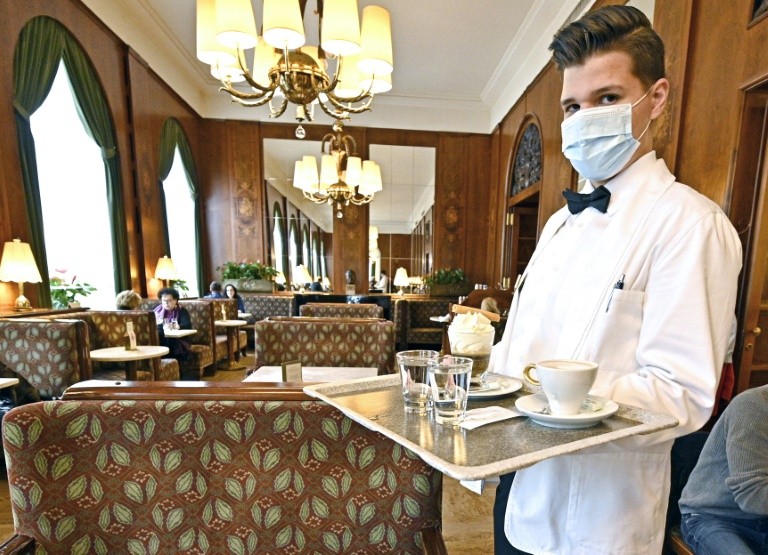More parts of Europe opened up on Friday despite fears of a second wave of the coronavirus pandemic, as shock new figures revealed the extent of the disease’s toll on the US and German economies.
Borders were reopening and lockdowns continued to ease from Australia to Austria as governments around the world tried to rebuild economies that have been shattered by the outbreak.
But the battle against COVID-19 is far from won, with more than 300,000 deaths and nearly 4.5 million infections globally, and the virus continuing to ravage the United States and Russia.
With a vaccine a year away at best and the World Health Organization warning the virus might never go away, countries are taking steps to try to return life to something like a semblance of normality.
Slovenia on Friday became the first European country to open its borders, declaring an end to its coronavirus epidemic, despite new infections still being reported.
Latvia, Lithuania and Estonia were set to create their own “Baltic bubble”, allowing free movement among the three countries, while Austria and Germany were expected to open their shared border.
– ‘We missed it’ –
Austria has been a pioneer in ending lockdowns and took an important symbolic step on Friday by reopening its restaurants and iconic Viennese cafes.
“It’s been hard for us that everything’s been closed,” said Fanny and Sophie, 19-year-old students waiting for breakfast at a cafe in the Austrian capital. “We missed it and we’re going to come back as much as possible.”
On the other side of the world, Sydney’s bars and restaurants opened their doors to customers Friday as a weeks-long lockdown eased.
“The desire to sit in a place that is not your house with your mates and have a drink is truly overwhelming,” said Chrissy Flanagan, owner of The Sausage Factory, a bistro in Australia’s biggest city.
In the Vatican, Saint Peter’s Basilica will reopen on Monday after a two-month closure due to the pandemic.
In badly-hit Italy, some beaches are reopening but the absence of tourists is still keenly felt, for example in the canal city of Venice, where even the pigeons have deserted the famed St Mark’s Square.
“Without tourists, Venice is a dead city,” said 66-year-old gondolier Mauro Sambo.
Russia pushed ahead with plans to ease restrictions despite reporting more than 10,000 new cases, with its football league set to return next month and thousands being tested for antibodies.
– US economic woes –
Germany was ready to relaunch its football championship on Saturday, although in front of empty stadiums and under draconian health measures.
However France called for self-restraint as the country prepared for its first weekend since its lockdown was eased on Monday, warning that police would break up any large gatherings.
France also announced the first death of a child from an inflammatory condition believed to be linked to coronavirus, as similar child fatalities are being investigated in New York and London.
The pressure to ease lockdowns has mounted as the catastrophic economic effects of the virus have become clearer.
In the United States, the world’s worst-affected country with more than 85,000 deaths, industrial production dropped a record 11.2 percent in April, the largest drop in 101 years.
With 36.5 million Americans left unemployed by the coronavirus crisis– more than 10 percent of the population — President Donald Trump has been keen to ease lockdown measures as he seeks re-election in November.
But Trump has also sought to deflect from his government’s handling of the pandemic by ramping up his war of words with Beijing over responsibility for what he has dubbed the “Plague from China”, threatening to cut ties between the two countries.
The virus first emerged in the Chinese city of Wuhan late last year before spreading around the world, fuelled by air travel and a globalised economy.
Europe’s top economy Germany meanwhile tipped into recession, suffering its worst steepest quarterly contraction since the global financial crisis in 2009.
Although the figure was smaller than steep GDP plunges in France, Italy and Spain, Berlin now expects a record 6.3 percent contraction in the economy for 2020.
– ‘Nightmare scenario’ –
Meanwhile the Asian Development Bank doubled its previous estimate of the cost of the pandemic, saying the world economy would shrink by $8.8 trillion — almost a tenth of global output.
The World Health Organization warned that Africa is a hotspot waiting to happen, despite so far having escaped the worst of the disease.
Researchers say fragile health systems on the world’s poorest continent could quickly be overwhelmed, with modelling suggesting 231 million people could become infected and up to 190,000 could die.
There was also concern over the discovery of infections in the world’s biggest refugee camp, in Bangladesh, where upwards of a million Rohingya Muslims from neighbouring Myanmar live in squalor.
Daniel Sullivan from Refugees International called it the “realisation of a nightmare scenario”.
In the Philippines, a powerful storm forced tens of thousands of evacuees into cramped shelters, making social distancing nearly impossible.
“It’s difficult to enforce because they are stressed. But we are doing our best,” local police official Carlito Abriz told AFP.
AFP
